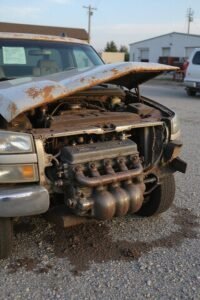You’ll want to avoid the 2018-2021 VW Atlas model years due to their documented transmission malfunctions, electrical system failures, and critical safety recalls. The 2018 model shows severe powertrain issues around 26,000 miles, while 2019 models suffer from coolant loss and airbag deployment problems. The 2021 Cross Sport exhibits unique electrical failures and door wiring defects. Understanding these model-specific issues can help protect your investment and safety.
The Most Problematic VW Atlas Years to Avoid
Three VW Atlas model years stand out as particularly problematic, with the 2018, 2019, and 2021 Cross Sport variants exhibiting the most severe mechanical and electrical issues. The 2018 Atlas issues include critical transmission malfunctions, manifesting as hard shifting and jerking at low speeds, alongside dangerous engine stalling incidents and fuel system leaks. Similar to engine failure problems documented in Kia’s past models, the 2019 Atlas continued with unresolved coolant loss problems and fractured rear coil springs, while introducing premature airbag deployments and erratic AEB system activation. The 2021 Cross Sport problems present a unique set of challenges, specifically related to electrical system failures, defective trailer hitch wiring, and persistent transmission complications. Similar to gauge cluster failures commonly reported in other vehicle models, these Atlas years experienced frequent check engine light triggers and electronic control module faults. When diagnosing these model years, you’ll frequently encounter check engine light triggers and electronic control module faults. Modern Atlas buyers are better served by choosing 2021 to 2023 models, which demonstrate significantly improved reliability ratings and fewer mechanical issues.
Engine and Transmission Red Flags
A thorough diagnosis of VW Atlas engine and transmission issues reveals critical patterns across problematic model years, with the 2018 variant exhibiting severe powertrain complications around 26,000 miles.
You’ll encounter engine stalling issues linked to fuel system failures, including malfunctioning injectors and pump defects across 2017-2021 models. The 66 reported complaints for the 2018 model year demonstrate an unprecedented volume of issues. Much like the faulty engine sensors experienced in similar commercial vehicles, these problems can lead to severe mechanical failures. Check engine warnings, grinding noises, and random shutdowns plague earlier years, while cooling system failures manifest through radiator leaks and coolant loss. Similar to the airbag inflator ruptures reported in other vehicle models, these mechanical failures pose serious safety concerns. When inspecting the transmission, watch for harsh shifting and transmission noise complaints, particularly in 2018-2019 models. These symptoms often correlate with electrical system faults and battery drainage issues.
For maximum reliability, you’ll want to scrutinize the vehicle’s maintenance history, focusing on cooling system integrity, transmission performance, and electrical system health before purchase.
Safety Concerns and Critical Recalls
Recent safety investigations reveal multiple critical recalls affecting VW Atlas models from 2018-2025, with two major campaigns targeting fire hazards and occupant detection system failures. You’ll find 2024-2025 models requiring engine cover removal due to fire risks, while 2018-2021 vehicles need PODS sensor mat replacements to restore proper airbag function.
The recall impact extends beyond immediate safety concerns, potentially affecting the model’s safety ratings and resale value. The manufacturer’s removal of loose engine covers affects over 170,000 vehicles in the latest recall campaign. You should avoid 2024-2025 models until dealers complete the engine cover modifications, and exercise caution with 2018-2021 vehicles that haven’t undergone PODS repairs. When shopping for a used Atlas, verify recall completion status through VW’s customer service or your local dealer before purchasing, as incomplete recalls pose significant safety risks.
Electrical System Failures Across Model Years
Beyond the safety recalls, electrical system malfunctions present compelling evidence for avoiding specific Atlas model years. The 2017-2019 models exhibit systemic failures requiring multiple battery replacements and showing persistent error codes across crucial systems. Electrical diagnostics reveal simultaneous faults affecting tail lights, brake lights, and essential control modules.
The 2020-2023 models, particularly the 2021 year, demonstrate severe electrical deficiencies with documented door wiring harness defects impacting airbag functionality. You’ll encounter frequent battery depletion issues, often within two months of replacement, along with erratic electronic brake behavior and auto start/stop system failures. The recurring electrical problems affect everything from basic operations to advanced safety features, with dealerships struggling to diagnose and resolve these complex electrical system failures effectively.
Interior Quality and Water Damage Issues
While water intrusion plagues multiple VW Atlas generations, the 2018-2024 models exhibit severe interior deterioration stemming from defective drainage systems. You’ll find interior leaks primarily concentrated in the panoramic sunroof drains, which frequently clog and redirect water into the cabin. The 2018-2019 models are particularly susceptible to water damage, showing extensive problems in driver’s footwells and spare tire compartments.
The resulting moisture creates persistent mold beneath floor mats and compromises interior materials. You’ll need to regularly inspect and clean drain tubes, especially checking for spider trap blockages. Water damage manifests through visible staining on headliners, musty odors, and deteriorating upholstery. Professional intervention may be necessary to properly dry affected areas and prevent long-term material degradation, particularly in models with recurring drainage issues.
Best Model Years for Reliability
Selecting a reliable VW Atlas means focusing on the 2020, 2022, and 2023 model years, which demonstrate notably improved build quality and fewer mechanical issues. These model years show substantial reliability ratings improvements, with the 2020 version marking a vital turning point by reducing NHTSA complaints by 95% compared to earlier models.
You’ll find enhanced electrical system diagnostics and powertrain refinements in these years, resulting in fewer service visits and warranty claims. The 2022 and 2023 models further optimize these improvements with more stable safety systems and enhanced technological integration. These versions showcase better build consistency, more responsive controls, and upgraded interior materials. When examining service records, you’ll notice markedly fewer electrical glitches and transmission-related repairs compared to pre-2020 models. Unlike the CVT transmission issues that plagued multiple years of the Nissan Rogue, these Atlas model years maintain consistent drivetrain reliability.
Common Repair Costs and Maintenance
Understanding repair costs for the VW Atlas reveals three critical expense tiers that owners should anticipate. Your routine service costs start at $358 in year one but escalate to $1,246 by year ten. Major component failures constitute the second tier, with timing chain tensioners ($1,656-$2,089) and camshafts ($2,391-$2,961) being particularly expensive fixes. The third tier encompasses mid-range repairs like alternators ($1,184-$1,820) and heater cores ($935-$1,066).
Your repair frequency increases considerably with age, starting at a 2.33% probability in year one but jumping to 23.55% by year ten. After the decade mark, you’ll face a sharp uptick in repair likelihood – reaching 43.94% by year twelve, with annual maintenance approaching $1,447. These escalating costs make extended warranty coverage a prudent consideration.
Expert Recommendations for Used Atlas Buyers
A thorough diagnostic assessment of VW Atlas model years reveals specific production cycles to avoid during your used vehicle search. When conducting features comparison testing, steer clear of the 2018-2020 models due to prevalent transmission defects, electrical failures, and infotainment malfunctions that greatly impact resale value.
For ideal reliability metrics, target 2022-2023 model years, which demonstrate considerably reduced repair frequencies and enhanced build quality. If budget constraints necessitate an older model, the late-2020 production run shows marked improvements in powertrain performance and electronic systems integration. When evaluating potential purchases, prioritize units with detailed service documentation, focusing specifically on transmission maintenance intervals and electrical system diagnostic reports. The 2024 refresh further validates VW’s commitment to resolving earlier engineering deficiencies.



